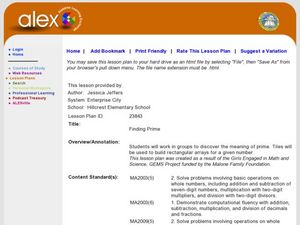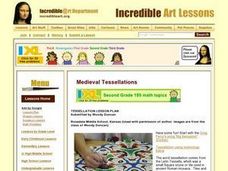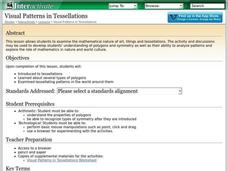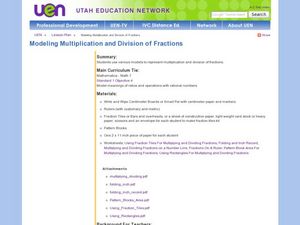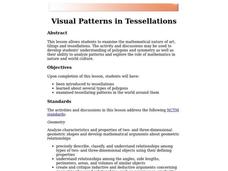Curated OER
Tiling Tessellations
Students explore tessellations. In this shapes and geometry lesson, students describe the attributes of many of the shapes displayed on an Elmo. Students create examples of tessellations using pattern blocks.
Curated OER
Terrific Tessellations
Students construct tesselations that fosters their ability to create, transform, and critique their own piece of work. This allows them to become aware of repeated patterns in math, and connect these patterns to artwork.
Curated OER
Tessellations: Geometric Patterns
Learners create tessellation drawings using repeating geometric shapes.
Curated OER
Tiling the Classroom
Students see how to identify regular polygons, how to slide, turn and flip polygons, and why certain polygons tessellate better than others. Groups create a one foot square design to be used to tile the classroom. Great instructional...
Curated OER
Try Tessellation
Most middle schoolers probably feel that quilting is at best an activity left to their grandmothers. This lesson uses the Zome modeling system to get them to realize how shapes in quilting are really tessellations and repeating patterns....
Curated OER
Seeing is Believing - Or Is It?
Here is a great science instructional activity. It extends the concept of vision into the area of optical illusions, perspective, and tessellation. This well-designed plan has tons of great activities, utilizes interesting video, and...
Alabama Learning Exchange
Finding Prime
Fifth and sixth graders explore prime numbers. They work with a partner to build rectangular arrays using twelve tiles. Factor pairs are noted and recorded on graph paper. Pupils construct rectangular arrays with a prime number and...
Curated OER
Tessellating Ceiling Tiles
Learners transform polygons. In this tessellating lesson plan, students design a picture containing a translation and a rotation. They create a template of a translation or a rotation. Learners tessellate and decorate a...
Curated OER
Egg-streme Tesselation
Sixth graders view a video of tessellating an egg shape. They focus upon the problem solving strategies used and how tessellation geometry was used to construct the three dimensional figure. They create their own tiling patterns.
Curated OER
Exploring Tessellations
Fifth graders examine how to make tessellations. In this tessellation activity, 5th graders review the meaning of the word "polygon" while the teacher shows them various examples. They practice making tiling patterns or tessellation's...
Curated OER
What do two-dimensional tessellations look like? Where in art can they be found?
Young scholars explore the world of art and culture, including the works of M.C. Escher. They identify and create original tessellations. Students use a wealth of interactive multimedia applications. They explore the artistic...
Curated OER
Tessellation Lesson Plan
Students produce original tessellations, using equilateral triangles where three unique symmetrical faces rotate, use shape, pattern/repetition, and color to create a striking composition, and create "beasties" inspired by bestiaries of...
Curated OER
Tessellations
Students identify and construct figures that tessellate. They investigate which regular polygons tessellate and how to modify them to make other tessellating figures. Students explore how naturally occurring tessellations have been...
Curated OER
Grade 5: Testing for Tessellations
Fifth graders use formal geometric language to describe polygons (and other shapes) that will tessellate the plane and those that will not. Students make generalizations about the characteristics of a polygon (or other shape) that will...
Shodor Education Foundation
Visual Patterns in Tessellations
Geometers explore the concept of tessellations. They use a tessellation applet to manipulate shapes and design their own tessellation using the applet.
Curated OER
Modeling Multiplication and Division of Fractions
Create models to demonstrate multiplication and division of fractions. Using fraction tiles to model fractions, pupils explore fractions on a ruler and use pattern blocks to multiply and divide. They also create number lines with fractions.
Curated OER
The Wonderful World of Escher
Bridging art and math can be as easy as making tessellations. The art, context, and life of M.C. Escher is explained to the class, as is the concept of tessellations. After a bit of art history, pupils get out the ruler, tape, and...
Curated OER
Tessellations
Learners identify shapes that will tessellate. They construct a tessellation using transformations. Students identify transformations in tessellations. They identify applications of transformations such as tiling and fabric design.
Curated OER
Tesselations
Seventh graders produce a tessellation of an original design developed using an equilateral triangle, where three unique symmetrical faces rotate throughout their creation.
Curated OER
Tessellations Lesson
Fifth graders demonstrate their understanding of tessellations by watching a teacher prepared Powerpoint presentation and completing an activity. The students work independently to identify tessellations.
Curated OER
Tessellations
Students create tessellations. In this geometry lesson, students use polygons to create different patterns by rotation. They identify the reasons for polygons to create the type of tessellation it does.
Curated OER
Visual Patterns in Tessellations
Students explore tessellations as well as various types of polygon. Students examine tessellating patterns in the world around them. Students examine tessellations by creating their own tessellations and completing the included worksheet.
Curated OER
Tiling the Plane
Fifth graders use pattern blocks and triagular grid paper to reivew shape names, be introduced to the concept of a tiling of the plane, and determine which pattern blocks tile the plane. They are asked if they comprehend what a...
Curated OER
Tessellation
Students create an art piece incorporating tessellating shapes, translational symmetry, reflectional symmetry,and or rotational symmetry. They are asked if they know the definition of tessellation. If so, students are asked what shapes...






